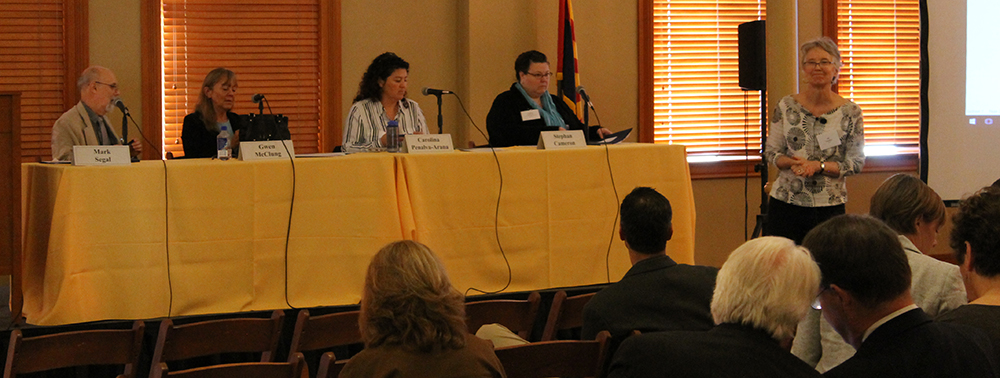CSPO News
Engaging the Public on Genetically Engineered Algae
Experts and regulators agree that regulating emerging technologies often requires deeper engagement with public values and perspectives. A recent workshop led by CSPO provides specific recommendations.
 By tinkering with their genetic information, scientists are able to engineer algae—the microscopic plants at the base of the aquatic food chain, and the bane of aquarium owners everywhere—that can grow faster, get fattier, and resist harmful bacteria. This could have revolutionary impacts on everything from food to fuel alternatives to new types of drugs. The first field trials of genetically engineered algae are being completed with the approval of the US Environmental Protection Agency (EPA). Researchers, including those who recently completed a study at the University of California San Diego, hope to make algae-based products significantly more affordable. With genetically engineered algae posed to transform our food, energy, and pharmaceutical industries, the EPA has recognized the need for substantive public input in how genetically engineered (GE) algae research is performed.
By tinkering with their genetic information, scientists are able to engineer algae—the microscopic plants at the base of the aquatic food chain, and the bane of aquarium owners everywhere—that can grow faster, get fattier, and resist harmful bacteria. This could have revolutionary impacts on everything from food to fuel alternatives to new types of drugs. The first field trials of genetically engineered algae are being completed with the approval of the US Environmental Protection Agency (EPA). Researchers, including those who recently completed a study at the University of California San Diego, hope to make algae-based products significantly more affordable. With genetically engineered algae posed to transform our food, energy, and pharmaceutical industries, the EPA has recognized the need for substantive public input in how genetically engineered (GE) algae research is performed.
Motivated by the decision to update their “Points to Consider in the Preparations of the TSCA Biotechnology Submissions for Microorganisms,” which was last revised two decades ago, the EPA partnered with the Expert and Citizen Assessment of Science and Technology (ECAST) network—for which the Consortium for Science, Policy & Outcomes serves as principal coordinator—to expand the breadth and reach of their engagement of citizens in their rule-making process. ECAST has now released a new report to share its findings.
The EPA regulates the use of intergeneric microorganisms, meaning those tiny life forms that have been modified with genetic material from other organisms. This includes GE algae in commerce or commercial research under Section 5 of the Toxic Substances Control Act. Under federal law, the EPA is required to follow a process that allows for public comment and input when proposing regulations. While open comment periods and public meetings ensure a degree of transparency, the EPA recognizes that this formal communication may not be sufficient to integrate public values into highly technical decision-making processes.
The method of public engagement in governing emerging technologies developed by ECAST addresses the tension between democratic and expert-led decision making. It offers the opportunity for mutual learning, integrating formal expertise, local knowledge, and public engagement. It provides transparency and offers a form of informed consent. Finally, engagement can build trust among experts, stakeholders, and public audiences.
In order to determine how to best engage the broader public in the governance of GE algae, ECAST hosted a workshop on the Tempe campus of Arizona State University. This workshop was funded by the EPA, with additional support provided by ASU’s School for the Future of Innovation in Society and Office of Knowledge Enterprise Development; the Keystone Policy Center; and North Carolina State University’s Genetic Engineering and Society Center. Participants at the workshop included representatives from universities, federal regulatory agencies, national laboratories, trade associations, non-governmental organizations, and industry.
Workshop participants discussed key design considerations including information flow, participant recruitment, education and empowerment, and decision support. The workshop generated a list of guidelines to implement broader public engagement initiatives with respect to GE algae and their products. These guidelines included:
- Specific scenarios on different algae applications make it possible to consider technological alternatives, potential social and environmental benefits, implied tradeoffs, and key areas of scientific uncertainty.
- Stakeholder transparency about design choices, goals, and strategies for incorporating the results of citizen engagement into decision making.
- Planning engagements when the technology is still at a conceptual stage in order to limit the public’s fear of algae biotechnology advancing too quickly.
In addition to providing concrete recommendations to the EPA about its GE algae regulatory processes, the workshop collected diverse perspectives and created a foundation for future collaborative engagement across sectors.
Read the report in full here.